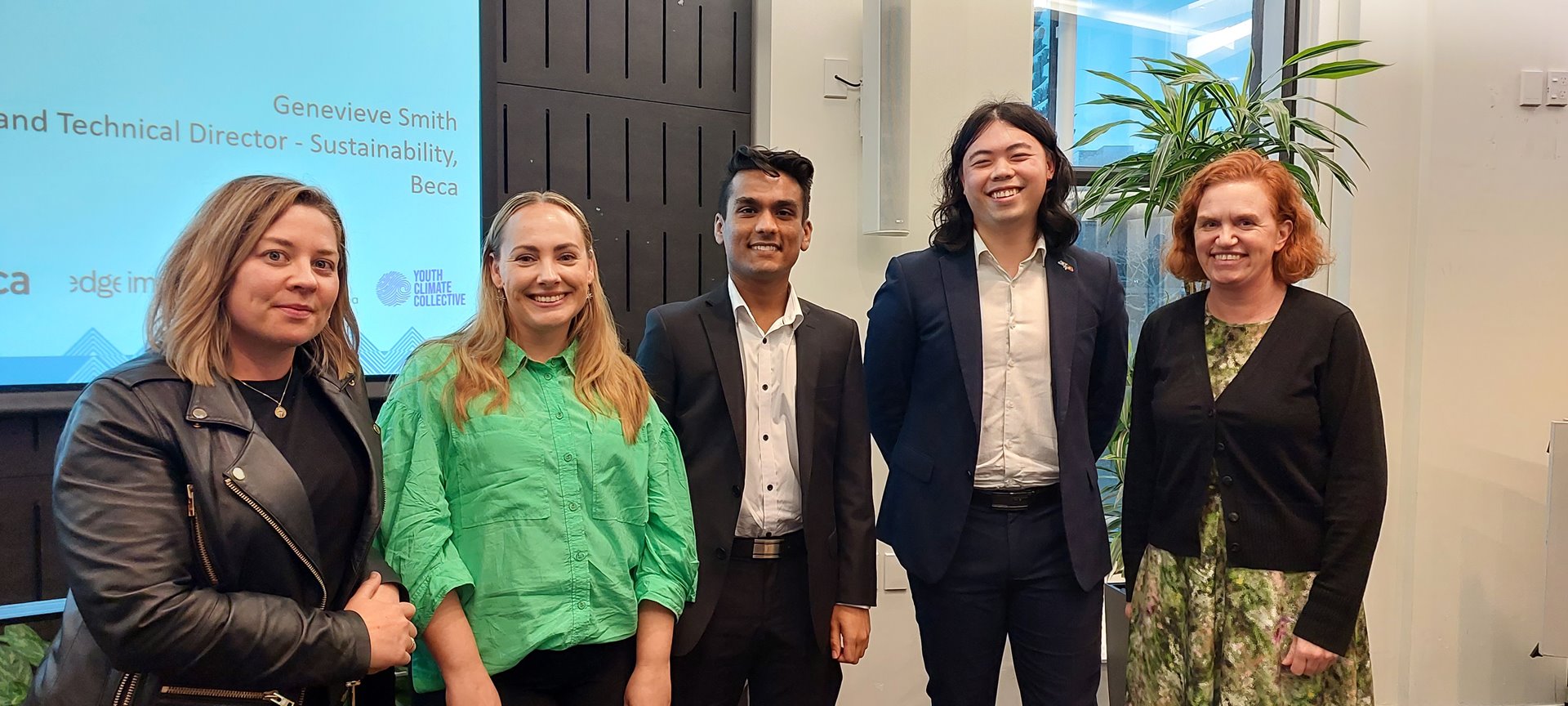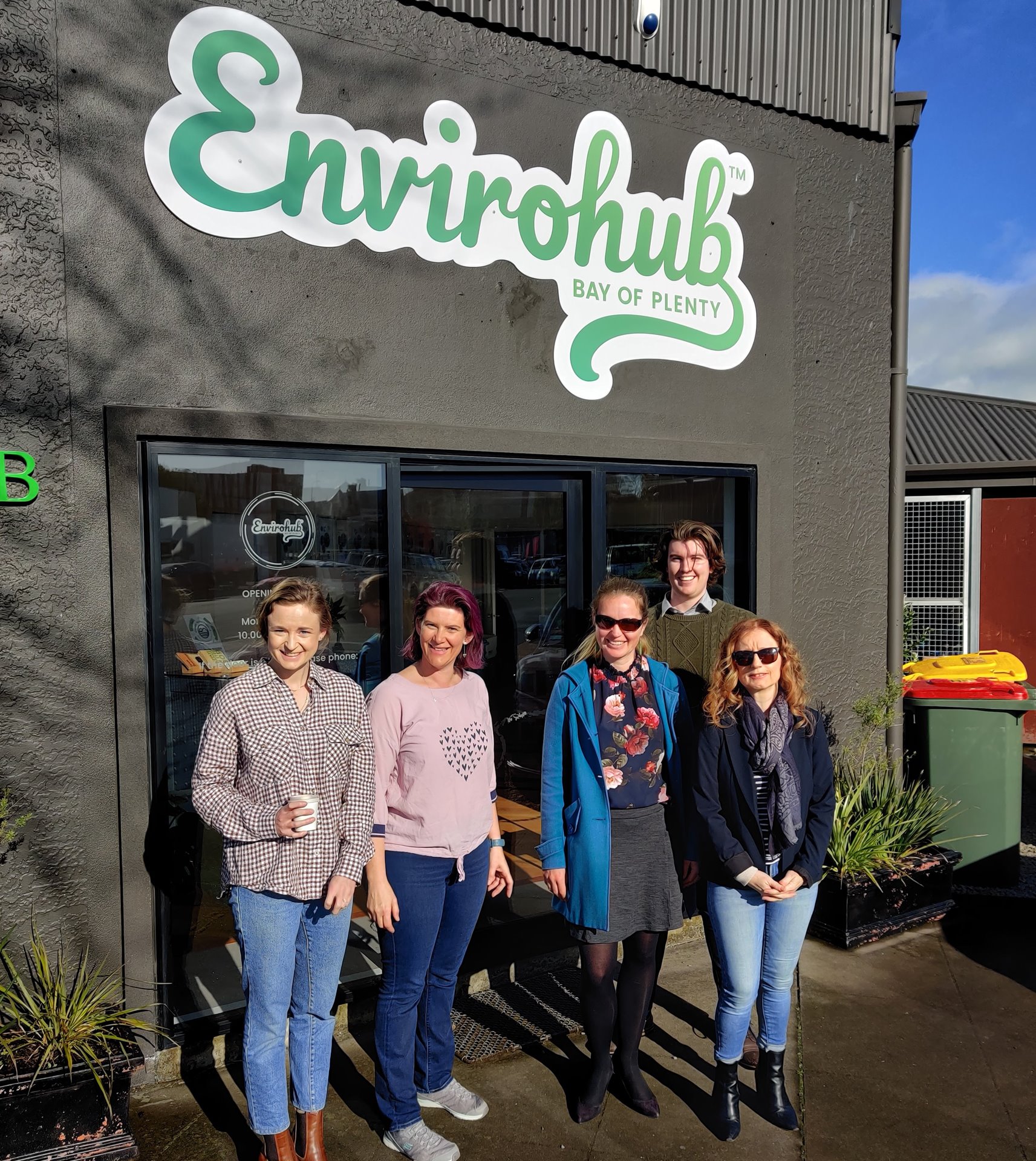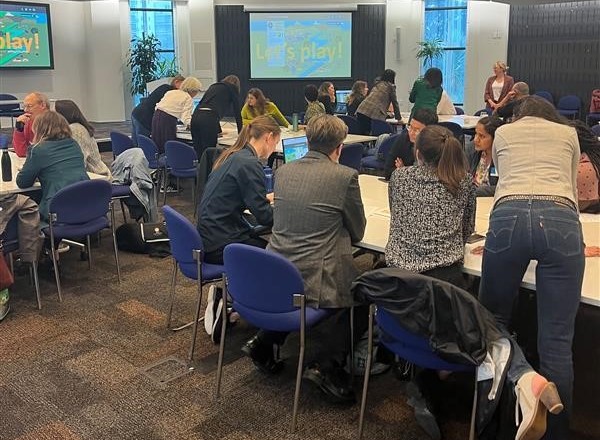Facing growing climate challenges, Beca hosted Climate Festival events in Auckland and Tauranga in September, showcasing our commitment to collaborating with like-minded organisations and educating clients and the community on climate adaptation and resilience. In particular, the Auckland Climate Festival is an annual month-long event in Tāmaki Makaurau that encourages joint efforts between communities, rangatahi, advocates, and the government for heightened, effective climate action.
In this article, we touch base with several Beca speakers who participated in the events, gathering their key insights and takeaways. Discover how we partnered with various organisations for panel discussions, interactive workshops, and game-based learning experiences, tackling topics such as climate equity, fast fashion, and dynamic futures.
Auckland Climate Festival: Climate Equity in Aotearoa
During the month, Beca hosted a panel in partnership with Edge Impact and Eco Choice Aotearoa, and heard a number of engaging and thought-provoking discussions. The discussion focused on the disproportionate impacts of climate change in Aotearoa and the urgency to protect our community and environment.
Panellists Pok Wei Heng - Sustainable and Ethical Procurement Consultant at Edge Impact, Jo Healy - Social Impact Specialist at Beca, Laura Gemmell - Chief Executive at Eco Choice Aotearoa and Dylan Chand - Founder of the Youth Climate Collective, offered a wealth of knowledge. Discussion centred around strategies to encourage involvement, build momentum, and promote fair outcomes within the community.
Jo Healy says, “When it comes to climate change and climate events, there will inevitably be people who experience a greater degree of impact. The focus of specialists working in this space, should be on ensuring that it's not always the same individuals that have to bear these impacts.”
Key insights from Climate Equity in Aotearoa:
- Breaking barrier by focussing on people’s drivers to implement behavioural change instead of convincing people of the ‘science.’
- Recognise each component of society’s vulnerability and strengths prior during and after climate events.
- Understand how to engage intergenerationally. Consider the requirements placed on communities to participate in conversations around climate change. Particularly in relation to valuing participants time and effort and consultation fatigue.

Pictured from left: Kirsty Johnston, Laura Gemmell, Dylan Chand, Pok Wei-Heng and Jo Healy at the Climate Equity in Aotearoa event in September.
Tauranga Climate Festival: Fast Fashion: From siloes to systems thinking
As part of the Tauranga Climate Festival, Beca partnered with Mount Maunganui College and Enviro Hub to orchestrate an engaging and interactive workshop dedicated to fast fashion, systems thinking and the circular economy.
Looking to the next generation, the workshop introduced high school students to the mechanics of t-shirt supply chains, circular economy principles, and a gamified session using Lego.
For the Lego-based activity, each group was given a different set of rules to create a building. They were then given a set time to ‘get creative’, ending with the task of filling out a circular and carbon assessment form. The activity concluded with a discussion about how it was unfair some groups had all the rules, while others only part or no rules. The purpose of this was to demonstrate how life works around the choices we make. For example, if we choose not to integrate circular design principles now, we won’t have any or much less materials (or very costly ones) in the future.
The workshop provided students with a holistic understanding of the deep links between social, environmental, and economic aspects. They also learned how individual actions can significantly influence our collective future.
Key insights from Fast Fashion: From siloes to systems thinking:
- Understanding the difference between a linear and circular economy. See a recent article here.
- Encouraged to adopt a fresh perspective on daily decisions.
- The importance of considering a consumer mindset, emphasising factors such as buying locally, prioritising quality, and even abstaining from buying altogether if not ethical
- Ability to see the bigger picture and identify strong interconnections between social, environmental, and economic aspects.
Tania Hyde, Beca Technical Director & Circular Design Lead (Transport & Infrastructure), commended the event, saying, “It’s great to see such a positive ripple effect throughout the community through this event.”

Pictured from left: Lauren Boyd, Tania Hyde, Alana Smith, Jack Davison and Debbie O'Byrn at the Fast fashion: from siloes to systems thinking event in September.
Auckland Climate Festival: Dynamic Futures
The month's concluding event turned climate adaptation decision-making into an interactive experience, hosted by Beca, Environmental Defence Society and NIWA (National Institute for Water and Atmospheric research). With towns and cities grappling with intensifying natural hazards, strategies on avoidance, protection, accommodation, or retreat are crucial.
The event's facilitators comprised Beca's Cushla Loomb, Business Director - Climate Resilience; Raewyn Peart, Policy Director at Environmental Defence Society; and Alex Fear, Senior Communications Advisor at NIWA. Each brought their unique expertise into play, making the session more engaging and informative. By turning a typically daunting subject into a captivating learning experience, they demonstrated that even the toughest challenges can be overcome through shared action and advanced thinking.
Reflecting on the event, Cushla says “It was amazing to host 50 climate enthusiasts and explore the complex decision-making process involved in climate resilience. This is a reminder of the real risks our communities face.”
Key insights from Dynamic Futures:
- Making decisions when there is uncertainty is difficult but keeping what you value at the centre is important.
- Some options need long lead in times, and it is better to get those in place early and before funds must be diverted into repairs.
- True collaboration gives more people the chance to thrive during tough times. Without it, larger societal inequalities could emerge over time.
- The connection Māori people feel to the whenua differs significantly from that of the average townsperson. Their inability to simply 'sell up and move' complicates decision-making, highlighting the essential role funding sources play - or, indeed, the power of collaboration.

As a final note, hosting these events underlines Beca's commitment to sustainability and our core purpose of making everyday better. By joining forces and actively engaging with our diverse communities, we encourage a sense of unity and shared responsibility. Through knowledge exchange and initiatives, we pave the way for a more sustainable future, in which everyone's voice is heard. Together, we can make a lasting and positive impact on our planet, where both present and future generations can thrive.
Discover more about our collaborative efforts with clients and communities in shaping a more climate-resilient and sustainable future, or contact our thought leaders below.